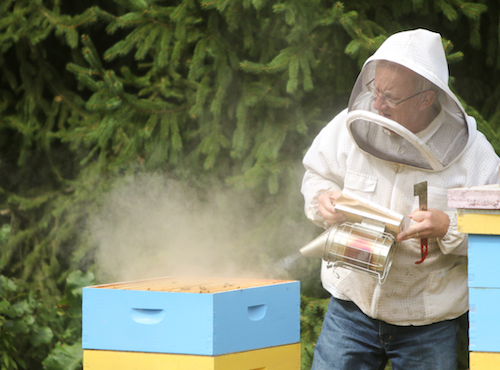Backyards in Berlin Center offer bees a pollinators paradise

By Sarah Lehr
BERLIN CENTER
Bruce Zimmer has persuaded his neighbor not to mow his lawn.
This has allowed pollinator plants to flourish. Others refer to these plants as weeds, but Zimmer prefers the term “wildflowers.”
Zimmer, president of the Columbiana & Mahoning County Beekeepers’ Association, has eight beehives on his property in Berlin Center. The bees flourish when they can pollinate flowering plants in nearby fields.
“He’s thrilled to death,” Zimmer said of his neighbor. “Because, when he goes down there, there’s bees, butterflies, all the creatures that love those wildflowers.”
Zimmer, a retired computer science teacher who describes himself as a “frustrated farmer,” became interested in bees five years ago. He had heard about bees under threat because of pesticides and habitat loss.
Colony Collapse Disorder – the phenomenon that occurs when worker bees leave their hives, spelling destruction for the queen bee and the rest of the colony – has gained global media attention. Some farmers reported unusually high levels of CCD in 2006 and 2007, though the situation seems to have improved in recent years, according to data from the Environmental Protection Agency.
Notably, Karen Pence, wife of the U.S. vice president, created some buzz when she installed beehives at the National Naval Observatory. Pence, who had previously set up beehives at the Indiana Governor’s Mansion, noted the importance of honeybees to the American agricultural industry.
The good news is that, because bees have short life cycles and can reproduce quickly, their populations can recover fairly quickly from decline.
The number of commercial honey-producing bee colonies reached a two-decade high of 2.74 million in 2014, according to data from the US Department of Agriculture.
When members of the Columbiana & Mahoning County Beekepers’ Association staff their booth each year at the Canfield Fair, the No. 1 question they get is: “How are the bees doing?”
Zimmer will respond with a discussion of ecosystems and of the honey bee’s critical role toward ensuring biodiversity.
Zimmer said membership in the association is one way to promote local bee populations. Membership, which costs $10 a year, includes access to a mentor club member, who will guide an aspiring beekeeper. The association, founded in 1984, now has more than 100 members.
Aside from the cost of equipment, Zimmer says the work necessary to maintain his beehives is negligible. He estimates he collects about 50 pounds of honey yearly from each hive.
“They’re bees – they know what to do and when to do it,” Zimmer said.
“They’re just doing bee things.”
 43
43
